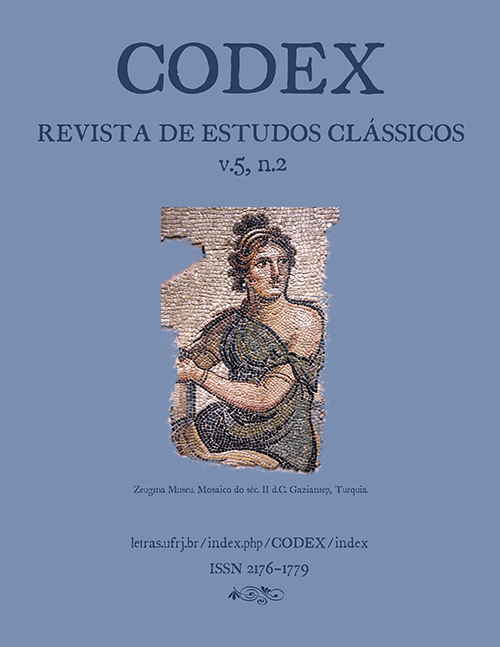The fabrication of Theseus' democratic identity: a comparative analysis between Bacchylides' dithyrambs 17 and 18 and Euripides' The Suppliant Women
DOI:
https://doi.org/10.25187/codex.v5i2.12501Keywords:
Euripides, Bacchylides, The Suppliant Women, Dithyramb, DemocracyAbstract
This article will seek to identify the political characteristics of the Athenian hero Theseus in Bacchylides' dithyrambs 17 and 18 and in Euripides' Suppliant Women. I will argue that elements of Athenian democracy can be traceable in these poems by two main aspects of the hero: his bellicosity and his benevolence towards the weak. These two attributes shall be the fundamental principles to shape a democratic Theseus, such as will be seen mainly through the above cited Euripides' play. I will show that Bacchylides' dithyrambs 17 and 18, by their turn, can be located in the beginning of a particular poetic tradition related to Theseus that settle its basis along with the Athenian democracy.
Downloads
References
BRANIGAN, K. “Minoan Colonialism”. The Annual of the British School at Athens, Vol. 76 (1981), pp. 23-33.
BURNETT, A. The Art of Bacchylides. Cambridge, Harvard University Press, 1985.
CLARK, C. “Minos´ Touch and Theseus´ Glare: Gestures in Bakkhylides 17”. Harvard Studies in Classical Philology, Vol. 101 (2003), pp. 129-153.
COLLARD, C., CROPP, M. Euripides. Fragments. Oedipus-Chrysippus. Cambridge, Harvard University Press, 2008.
D´ALESSIO, G. “The name of the Dithyramb”. IN: KOWALZIG, B., WILSON, P. Dithyramb in Context. Oxford, Oxford University Press, 2013.
DAVIE, J. “Theseus the King in Fifth-Century Athens”. Greece & Rome. Vol. 29, No.1 (Apr., 1982), pp. 25-34.
DEN BOER, W. “Theseus: the Growth of a Myth in History”. Greece & Rome, Vol. 16, No. 1 (Apr., 1969), pp. 1-13.
DOW, S. “The Minoan Thalassocracy”. Proceedings of the Massachusetts Historical Society, Third Series, Vol. 79 (1967), pp. 3-32.
FEARN, D. Bacchylides: Politics, Performance, Poetic Tradition. Oxford, Oxford University Press, 2007.
________ “Athens and the Empire: The Contextual Flexibility of Dithyramb, and its Imperialist Ramifications”. IN: KOWALZIG, B., WILSON, P. Dithyramb in Context. Oxford, Oxford University Press, 2013.
FLORES, G. “Ode 18, Teseu chega a Atenas”. Letras Clássicas, n.10, pp. 169-174, 2006.
FRENCH, A. “Athenian Ambitions and the Delian Alliance”. Phoenix, Vol.33, No.2 (Summer, 1979), pp. 134-141.
GERBER, D. Euterpe. An Anthology of Early Greek Lyric, Elegiac, and Iambic Poetry. Amsterdam, Adolf M. Hakkert Publisher, 1970.
GERBER, D. “Bacchylides 17, 124-29”. Zeitschrift für Papyrologie und Epigraphik, Bd. 49 (1982), pp. 3-5.
GISEKAM, G. “Some Textual Problems in Bacchylides XVII”. The Classical Quarterly, Vol. 27, No. 2 (1977), pp. 249-255.
GOUSHIN, V. “Athenian Synoikism of the Fifth Century B.C., or Two Stories of Theseus”. Greece & Rome, Vol. 46, No.2 (Oct., 1999), pp. 168-187.
IRWIN, W. “Bacchylides 17: Theseus, Minos and Delian League Ideology” IN: IV Simpósio Letras Clássicas. São Paulo, Humanitas, 2011.
KOHN, T. “The Wishes of Theseus”. Transactions of the American Philological Association (1974-), Vol. 138, No. 2 (Autumn, 2008), pp. 379-392.
LEFKOWITZ, M. “Review”. Classical Philology, Vol. 82, No. 4 (Oct., 1987), pp. 363-365.
MAEHLER, H. Die Lieder des Bakchylides II. Leiden, Brill, 1997.
MELLO, M. Os ditirambos de Baquílides: um poeta entre dois mundos. 2012. Dissertação (Mestrado em Letras Clássicas) -- Faculdade de Filosofia, Letras e Ciências Humanas, Universidade de São Paulo, São Paulo, 2012.
MICHELINI, A. “Political Themes in Euripides´ Suppliants”. The American Journal of Philology, Vol. 115, No. 2 (Summer, 1994), pp. 219-252.
MILLS, S. Theseus, Tragedy, and the Athenian Empire. Oxford, Oxford University Press, 1997.
NICOLA, F. “A. Severyns. Bacchylide. Essai biographique”. L'antiquité classique, Tome 3, fasc. 1, 1934. pp. 318- 321.
NIEMEIER, W. “When Minos ruled the waves: Knossian Power ovearseas”. British School at Athens Studies, Vol. 12, KNOSSOS: PALACE, CITY, STATE (2004), pp. 393-398.
OEVEREN, C. “Bacchylides Ode 17: Theseus and the Delian League”. IN: PFEIJFFER, I, SLINGS, S. (eds.) One Hundred Years of Bacchylides. Amsterdam, 1999.
PAVLOU, M. “Bacchylides 17: Singing and Usurping the Paean”. Greek, Roman, and Byzantine Studies Vol. 52 (2012), pp. 510-539.
PIEPER, G. “Conflict of Character in Bacchylides´ Ode 17”. Transactions of the American Philological Association, Vol. 103 (1973), pp. 395-404.
RAGUSA, G. Lira Grega: Antologia de Poesia Arcaica. São Paulo, Ed. Hedra, 2014.
SCHMIDT, D. “Bacchylides 17: Paean or Dithyramb?” Hermes, 118. Bd., H. 1 (1990), pp. 18-31.
SCODEL, R. “The Irony of Fate in Bacchylides 17”. Hermes, 112. Bd., H. 2 (2nd. Qtr., 1984), pp. 137-143.
SEGAL, C. “Bacchylides Reconsidered: Epithets and the Dynamics of Lyrics Narrative”. Quaderni Urbinati di Cultura Classica, No. 22 (1976), pp. 99-130.
SELTMAN, C. “Theseus and the Minotaur of Knossos”. The South African Archaeological Bulletin, Vol. 8, No. 32 (Dec., 1953), pp. 98-99.
SEVERYNS, A. Bacchylide. Essai biographique. Liege, Ed. Droz, 1933.
STARR, C. “The Myth of the Minoan Thalassocracy”. Zeitschrift für Alte Geschichte, Bd. 3, H. 3 (1955), pp. 282-291.
SUTTON, D. “Euripides´ ‘Theseus'”. Hermes, 106. Bd., H. 1 (1978), pp. 49-53.
TILLYARD, E. “Theseus, Sinis, and the Isthmian Games”. The Journal of Hellenic Studies, Vol. 33 (1933), pp. 296-312.
UNZ. R. “The Chronology of the Pentekontaetia”. The Classical Quartely, Vol.36, No.1 (1986), pp. 68-85.
WALKER, H. Theseus & Athens. Oxford, Oxford University Press, 1995.
WEST, A. “The Tribute Lists and the Non-Tributary Member of the Delian League”. The American Historical Review, Vol. 35, No. 2 (Jan., 1930), pp. 267-275.
WIND, R. “Myth and History in Bacchylides Ode 18”. Hermes, 100. Bd., H. 4 (1972), pp. 511-523.
Downloads
Published
How to Cite
Issue
Section
License
This work is licensed under a Creative Commons Attribution-NonCommercial 4.0 International License.










